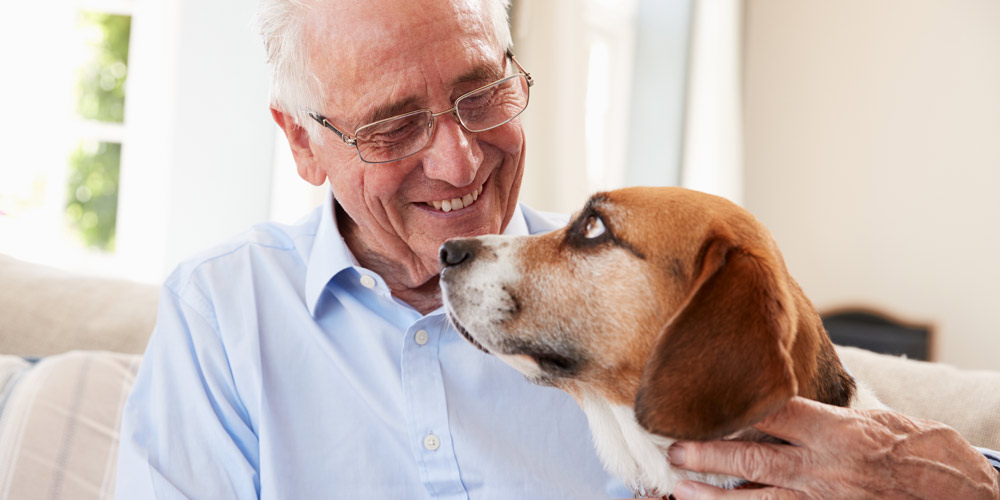What Makes a Dog Suitable for Senior Citizens?
 Dogs can make wonderful pets for senior citizens. Aside from reducing loneliness, caring for a dog is linked with many health benefits and can help the new owner to stay active.
Dogs can make wonderful pets for senior citizens. Aside from reducing loneliness, caring for a dog is linked with many health benefits and can help the new owner to stay active.
It’s important to choose the right dog though. Here are six tips for making a sensible choice.
1. Adopting an Older Dog is The Best Option
Many people love the idea of raising a puppy, but adopting an older dog is nearly always the best choice for a senior citizen.
Puppies need constant attention and care. They need to be trained, given plenty of mental stimulation, and constantly watched to ensure they stay safe. Housetraining also requires the owner to get up multiple times throughout the night.
In contrast, mature dogs tend to be calmer and are often housetrained. They also require less supervision and may have some basic training. This makes it easier to integrate the dog into the new owner’s lifestyle.
Of course, every dog is different. Some older dogs are still highly energetic and strong, which can make them difficult to handle. This is another reason why adopting a senior dog is often the best choice, as the owner can meet the dog and learn about their temperament.
2. Dogs Have Different Mobility and Exercise Needs
It’s essential to find a dog that matches the new owner’s mobility. All dogs need daily walks and play, but the amount can vary from a quick 30-minute walk to multiple long walks each day.
For this reason, it’s vital to ensure that the new owner is physically capable of meeting the dog’s exercise requirements. If the dog is young, then it’s also important to consider whether the owner’s mobility may change during the dog’s lifetime.
You shouldn’t rely on breed alone when judging a dog’s activity level. While breed can be an indicator of how much exercise a dog requires, age, health, and personality are also factors.
Another consideration is the owner’s living situation. Some dogs are happy in a small apartment, as long as they get daily walks. Others need plenty of garden time, which may not be possible in an apartment.
3. Some Dogs Need More Grooming Than Others
It’s important to discuss grooming with a potential dog owner. How much time are they willing to dedicate to brushing and other grooming tasks? Are they willing to take the dog to a professional groomer if required?
Some dogs only require a quick brush once a week to maintain their coat health. These breeds typically have short, single-layer coats that don’t continuously grow.
Others need daily brushing to avoid mats and regular trims by a professional groomer. Aside from being time-consuming, high-maintenance dog coats are also expensive to maintain.
4. Don’t Overlook Strength and Size
Depending on the age and health of the new owner, a fall could be a serious health risk. While any dog could potentially cause a fall, an accident is more likely with a big or strong breed. These breeds are also more difficult to control on a walk and can’t be lifted in an emergency.
For this reason, it’s usually best for senior owners to adopt a small dog. Smaller breeds are easier to handle and are often better suited to small homes or apartments.
5. Remember That Dogs Can Be Expensive
It’s important to be aware of the various costs before adopting a dog. A senior citizen with limited income could be put under immense pressure if they can’t afford to care for their new pet.
Aside from the initial cost of adoption or purchasing from a breeder, a new owner also needs to pay for bedding, a crate, vaccinations, walking equipment, bowls, brushes, spay/neutering, and microchipping.
There are also many ongoing costs that are easy to overlook. Some examples include:
- Professional grooming (or home equipment such as nail grinders and clippers)
- Pet insurance
- Parasite protection
- Routine vet check-ups and vaccinations
- Food
- Dental chews and treats
Smaller dogs are usually less expensive than bigger breeds, mainly because they require less food. If you want to save money, it’s also important to look for a breed that doesn’t require much grooming, as this is one of the biggest ongoing costs.
6. Always Consider the Dog’s Needs
Dogs are a long-term commitment that require a lot of time and dedication. They need daily walks, play sessions, and attention. Dogs also need ongoing training, grooming, and veterinary care.
While it’s important to find a dog that meets the owner’s requirements, it’s equally important to consider the dog’s needs. Be honest about whether the new owner is capable of meeting a dog’s mental and physical requirements, otherwise adopting a new pet could be stressful and unfair on the dog.
Summary
The right dog for a senior citizen depends on many factors, including the person’s age, mobility, financial situation and living arrangements.
It’s nearly always best for senior citizens to adopt an older dog, as they tend to be calmer and easier to handle. Small breeds that require minimal grooming are also often a great choice.
–author anonymous
–photo from Shutterstock